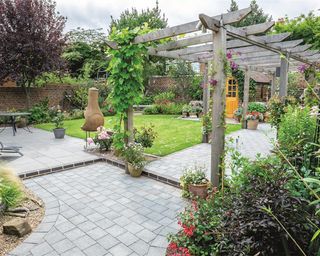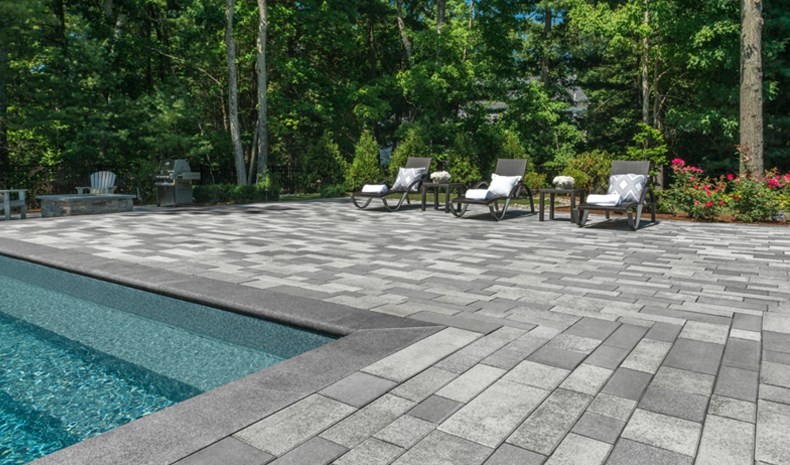‘Block paving is a really versatile product which can be used at both the front and rear of your property,’ says Lee Dunderdale, Product Manager at Bradstone. ‘I also recommend using block paving as an edging idea to offer a simple but effective design statement that will add a sense of shape and style to your garden and keep everything looking neat and tidy.’
Whatever look you’re going for, and whether it’s for a front yard, backyard, or edging design detail, we’ve got all the paving ideas you’ll need, from modern styles to more traditional designs. Here’s our edit of block paving ideas for you to browse and factor into your plans.
1. Choose block paving for driveways
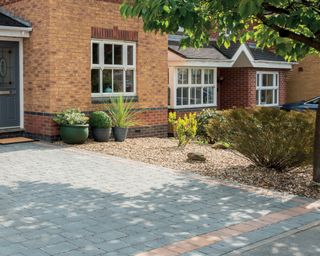
With its subtle hues and authentic weather-worn appearance, Bradstone’s Monksbridge in Gray-Green is perfect for the driveways of more traditionally-styled properties
‘Traditionally, block paving is more commonly used for driveways,’ says Bradstone’s Lee Dunderdale. ‘Whether you’re seeking charm and character or want to master a modern look, block pavers are available in a wide variety of colors and styles to suit any property and offer that much-desired curb appeal.’
Driveways also see large amounts of wear from cars and pedestrians. ‘Block paving not only offers a stylish option, but an extremely practical and durable solution. As long as it’s maintained well, it will stand the test of time,’ adds Lee. Don’t forget to enhance it at night, too, with some clever driveway lighting ideas to show it off.
Block paving like the design pictured can also be used to create a natural stone courtyard effect in a backyard setting.
2. Design a path with block paving
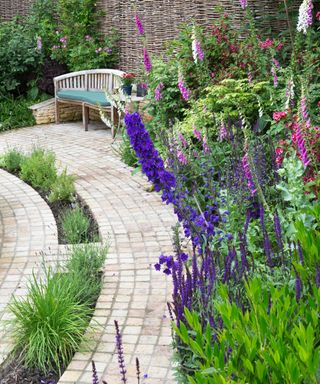
A curved design feature such as this whimsical path helps to enhance a small space
Block paving doesn’t need to be limited to driveways. With the endless design possibilities and durability offered by these pavers, they’re a good choice for the back garden too, especially for a garden path.
Weathered block pavers instantly bring warmth, texture, and a more rustic touch to any garden. They can be laid in a pattern of your choice, either in a simple design or a more ornamental herringbone or basketweave effect.
Adding an organic curved path to your landscaping ideas works well to create a sense of calm, harmony, and flow, especially if relaxed planting is added to the mix. If an idea like this is done well, it will add another layer of interest to your design.
3. Add a modern twist to classic block paving
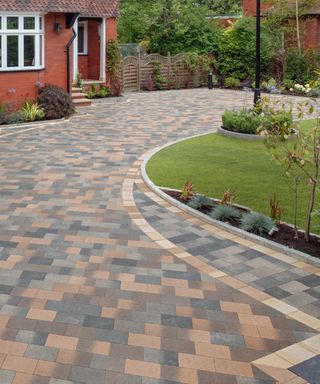
Marshalls’s Drivesett Coppice is a modern twist on classic block paving
It’s easy to create your own unique finish with block paving by mixing different block blends, sizes, and colors to customize your design and produce your very own take. You can also work in interesting edging design details to complete the look.
‘Block paving has more pros than cons,’ says Anna Hampshire from Marshalls. ‘It’s durable, long-lasting, and available in a wide range of finishes and colors, which enables you to get creative with the layout of your block paved surfaces.
‘Kiln-dried sand is the best sand for block paving joints, and we’d recommend an aggregate sub-base and not to lay on soil. To keep block paving looking pristine, be sure to follow a regular cleaning routine.’
Take a look at how to clean a driveway so you can keep the entrance to your home spruced up. Then you’ll have all the info you need right from the get-go once your new design is installed.
4. Use block paving for patio designs
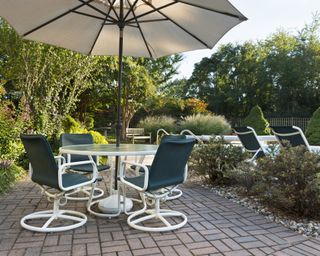
Not just for driveways and paths, block pavers can be used for patio designs too
Block paving is a staple of outdoor design, according to the experts at Infinite Paving. ‘When it comes to paver patterns and ideas, different layouts and patterns create very different visual effects, whether it’s square slabs arranged in a stretcher bond or rectangular slabs arranged in a herringbone pattern,’ says Rowan Cripps.
Block pavers offer a great opportunity for taking your patio up a level and turning your outdoor space into a real design feature. Rowan highlights the fact that individual blocks are replaceable if they become damaged – which could come in handy if you love entertaining a crowd.
5. Enhance a cocooning space with block paving
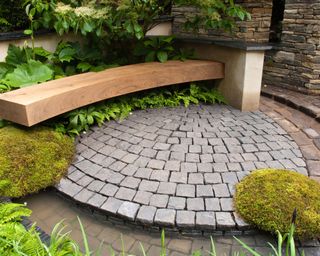
This eye-catching fanned block paving design adds a pretty but practical detail to a tranquil seating area
Everyone loves a quiet place to sit – somewhere you can feel more connected with nature as part of your sensory garden ideas. The sensory experience in this setup includes a combination of interesting textures, like these chunky block pavers.
A curved, wooden bench adds a pleasing contrast, while green foliage softens the scene.
6. Go modern and maintenance-free
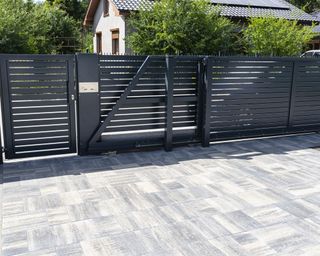
Good-looking and low-maintenance: the dream combination for a successful driveway makeover
If you’re looking for modern paving ideas, consider a driveway makeover to enhance your front yard. It’s easy to create a unique installation that really stands out and often, it can be as simple as choosing the right color mix to pull together your exterior look.
You can create a stunning effect that looks like a piece of art by using blocks with different color tones. Combining complementary shades of gray, for example, can create a cool and contemporary feel, or alternatively, choose contrasting colors to make more of an impact.
7. Consider a rustic look with cobbles
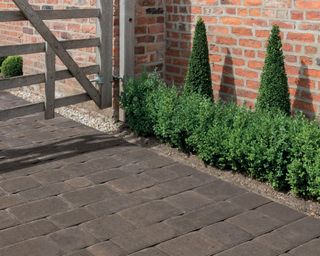
Lumley Cobble Block Paving by Bradstone in a weathered stone shade will look like it’s been in place forever
With block paving, you can be sure to find a style that suits your space. You might want to add some traditional charm to your plot, and if so, this beautiful cobble-effect design will look just right. But it’s equally at home in the city, too.
The joy of cobblestones is they add a timeless look to any driveway and work well with a range of different house designs. They are long-lasting and hard-wearing, so you won’t have to worry about wear and tear either. They also come in a variety of different colors, including brown, red, gray, and blue to match or contrast with your exterior aesthetic.
Cobble block pavers are also a charming look for small front gardens.
8. Introduce some special effects
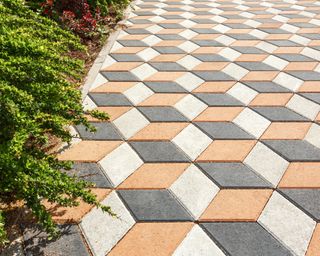
Create a show-stopper with an eye-catching block paving design
See this as your opportunity to shine by coming up with an idea for a one-off design that’s uniquely yours and could become the talking point of your neighborhood.
How about using block paving ideas to create a snazzy eye-catching optical illusion with a repeat pattern design? Made up of mid-gray, off-white, and terracotta ‘cubes’, the tones in this scheme are carefully placed to create light and shade to produce a 3-D effect.
Remember to look for block pavers that have anti-slip and frost-resistant properties, especially for paths and other high-traffic areas.
9. Choose permeable block paving as an eco option
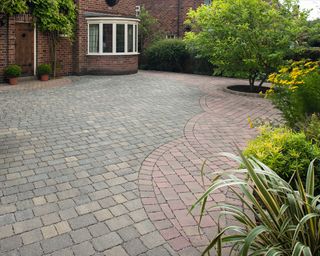
Drivesett Tegula Priora in Pennant Grey by Marshalls manages rainfall in a sustainable way, with surface water passing through it into the ground below
Block paving ideas also get a big tick if you want to find out how to create an eco-friendly garden. ‘Block paving is very environmentally-friendly and this is due to its porous nature,’ says Infinite Paving’s Rowan Cripps. ‘It draws in water rather than causing run-off.’
Particularly if you live in the city, water run-off can be an issue. Permeable paving is key in the prevention of flooding, especially in built-up areas. When surfaces aren’t permeable, rainwater runs off and can overwhelm drainage systems and cause flooding.
We have all the answers to your questions if you want to find out more about eco paving tips, as well as permeable paving and why you should consider choosing it.
10. Smarten up your front porch
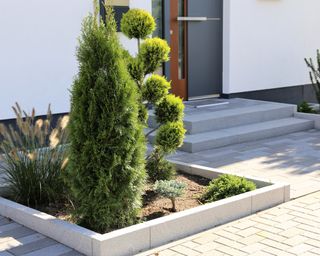
Block paving can be mixed with porcelain slabs and edging tiles for a smart and modern finish
Using block paving as part of your front porch ideas is a stylish way to bring character to your outdoor space, allowing you to create an inviting entrance to your home. It’s a flexible option, too, as this look works in lots of different spaces – both modern and classic.
If you’re looking for a clean, modern aesthetic to suit a new build, block paving is a great option and can be used to create any number of looks. If you choose paler colors, they will pair well with porcelain for a really crisp finish. Check out our modern edging ideas for more ways to get that perfect finishing touch.
Can you lay block paving on soil?
The advice is generally ‘no’ when it comes to the question of whether you can lay block paving on soil. But if the area doesn’t have any traffic, you could get away with not using a sub-base, says Jack Knight of Drainage Superstore. Just make sure the ground is firm and the soil is well compacted.
For proper installation, a subfloor needs creating and each block should be installed individually, which can be a time-consuming process. ‘For heavy traffic areas, such as driveways, we recommend a 200mm [8in] thick sub-base while lighter traffic areas can be thinner.’
Generally, a sub-base is made up of crushed stone or quarried materials. To install a sub-base, the topsoil and any other organic material need to be removed to the required depth. ‘Remember, that should include the depth of the sub-base itself,’ says Jack, ‘as well as around 40mm [1.5in] of sand and then the blocks themselves.’
